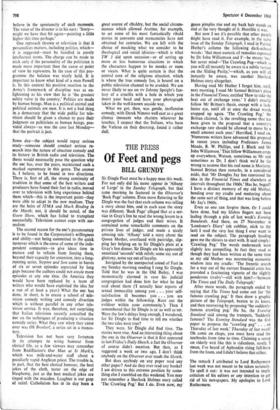Of Feet and pegs
THE PRESS BILL GRUNDY
Sir Dingle Foot must be a happy man this week. For not only did his name appear in 'Albany at Large' in the Sunday Telegraph, but that same morning he featured in the Observer's 'Back Page' column. Even more flattering to Sir Dingle was the fact that each column was telling a story about him, and in each case the story was different. 'Back Page' alleged that at a ser- vice in Gray's Inn he read the wrong lesson to a congregation of judges and their wives. It contained some remarkable comments on the private lives of judges, and made a nicely amusing tale. 'Albany' told a story about the Queen Mother, overfaced with partridge, slip- ping her helping on to Sir Dingle's plate at a Gray's Inn dinner. Sir Dingle ate his apparently unnoticed 'seconds' with relish; some say out of gluttony, some say out of loyalty.
Intrigued by the unexpected sound of Feet in my Sunday morning reading I rang Sir Dingle. Told that he was in the Old Bailey, I was momentarily alarmed in case his judicial congregation had done him for what he had said about them CI actually hear reports of sexual immorality among you . . . your self- satisfaction ill becomes you . . . you are judges within the fellowship. Root out the evildoer within your community.'). Then I remembered that Sir Dingle is QC as well as MP. Were the law's delays long enough, I wondered, for Sir Dingle to find time to tell me whether the two tales were true?
They were. Sir Dingle did find time. The stories were true. And an interesting thing about
• the one in the Observer is that it first appeared in last Friday's Daily Sketch, a fact the Observer of course didn't mention. But then, as I suggested a week or two ago, I don't think anybody on the Observer ever reads the Sketch.
But does anybody on any paper read any other paper? And do they ever read any books? I am driven to this extreme position by some- thing else I stumbled on this weekend. You may not remember a Sherlock Holmes story called 'The Crawling Peg.' But I do. Even now, my '
gpose pimples rise and my back hair stands on end at the very thought of it. Horrible it was.
But now I see it's possible that other people Might have read it. For example, in the same issue of the Sunday Telegraph, I read in Patrick Anther's column the following dark-echoed words: 'that most esoteric of remedies espoused by Dr John Williamson and I'—he means `me,' but never mind—The Crawling Peg—which as you will all instantly be aware is a subtle variant on the Sliding Parity,'—which, as you will all instantly be aware, was another Sherlock Holmes story altogether.
Having read Mr Hutber I forgot him, until, next morning, I read Mr Samuel Brittan's piece in the Financial Times, entitled 'How to take the heat out of exchange rates.' I didn't exactly follow Mr Brittan's thesis, except with a lack- lustre eye, until all at once the dread words cropped up again. The Crawling Peg,' Mr Britten claimed, 'is the revolting name that has
been given to the proposal that a country's
exchange rate should be allowed to move by a small amount each year.' Horrified, I read on.
'Numerous writers have advanced this proposal
in recent years including Professors James Meade, R. W. Phillips, and J. Black and Mr John Williamson.' That fellow Williamson crops
up everywhere, Watson, sometimes as Mr and sometimes as Dr. I don't think we'd be far wrong to assume that his real name is Moriarty.
Samuel Britten then remarks, in a considered aside, that `Mr Douglas Jay has canvassed the idea in the Financial Times and elsewhere at intervals throughout the 1960s.' Has he, begod? I have a distinct memory of my old Mother, bending over my cradle and muttering about the same sort of thing, and that was long before Mr Jay's 1960s.
Even so one can forgive them. Or I could have done, had my lifeless fingers not been leafing through a pile of last week's Evening Standards. And there, on 27 November in 'Londoner's Diary' (oh cobbler, stick to thy
last) I read the very last thing I ever want to
read on the subject. The paragraph heading gave me the shivers to start with. It said simply: 'Crawling Peg.' The words underneath were slightly less compelling. In fact they read as though they had been written at the same time as my old Mother was murmuring economic wisdom into my cradle: The frenetic search for a way out of the current financial crisis has provided a fascinating vignette of the slightly ponderous rivalry'—still with him?—`between The Times and The Daily Telegraph.'
After more words, the paragraph ended by saying that The Times had come out for 'the
famous crawling peg.' It then drew a graphic
picture of the Telegraph, beaten to its knees, and then recovering by proposing 'the suddenly-
famous crawling peg.' Ha ha, the Evening Standard said among the trumpets, 'Suddenly famous? The Evening Standard was the first paper to propose the "crawling peg" . . . on Thursday of last week.' Thursday of last week! Oh come on chaps, you must have read the
textbooks from time to time. Claiming a scoop on elderly writ like this is ridiculous, surely. I mean, I've heard of Aphrodite rising full-born from the foam, and I didn't believe that either.
The remark I attributed to Lord Rothermere last week was not meant to be taken seriously. To spell it out: it was not intended to imply criticism of his editors or any intention to get rid of his newspapers. My apologies to Lord Rothermere.


































 Previous page
Previous page